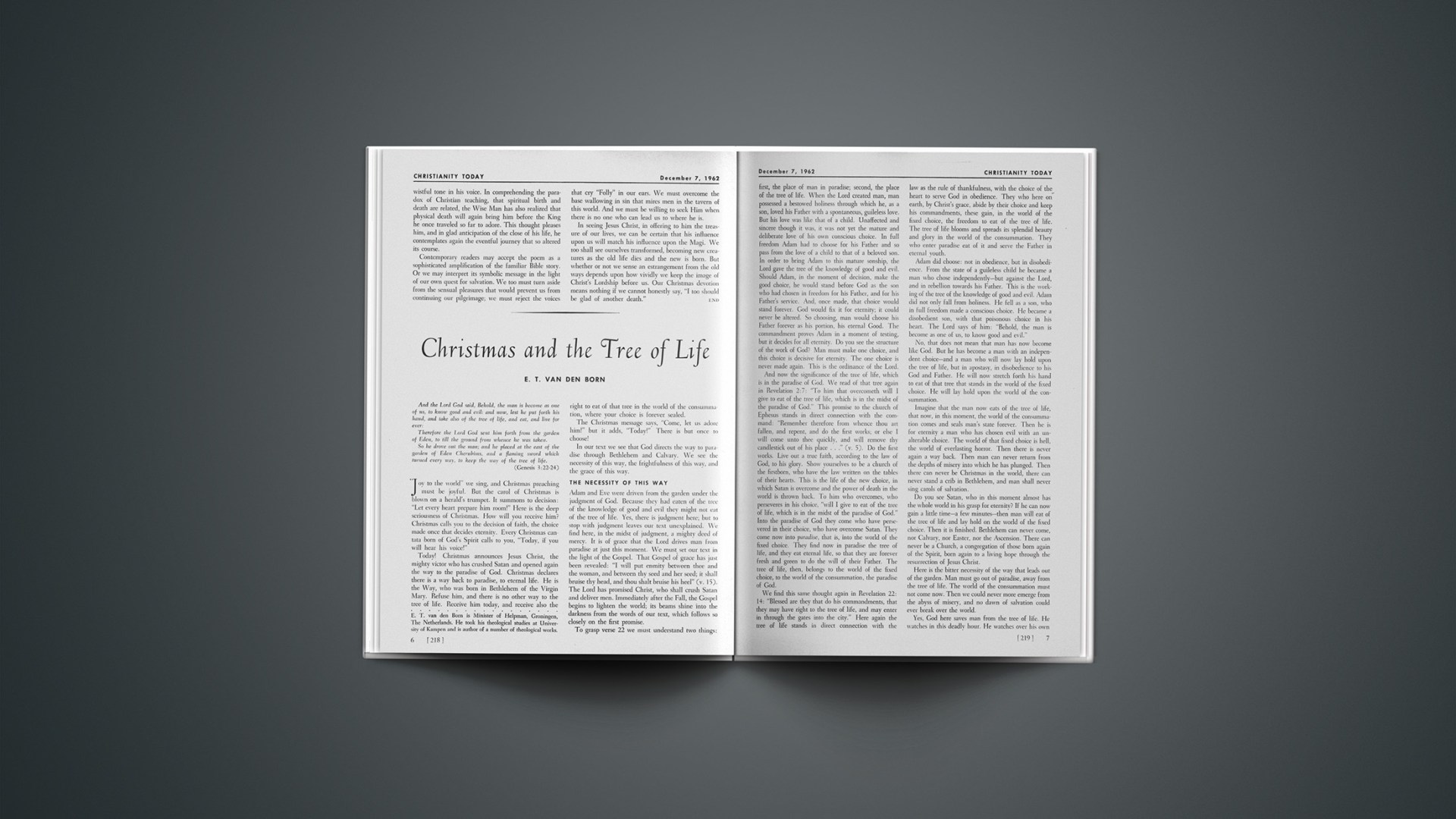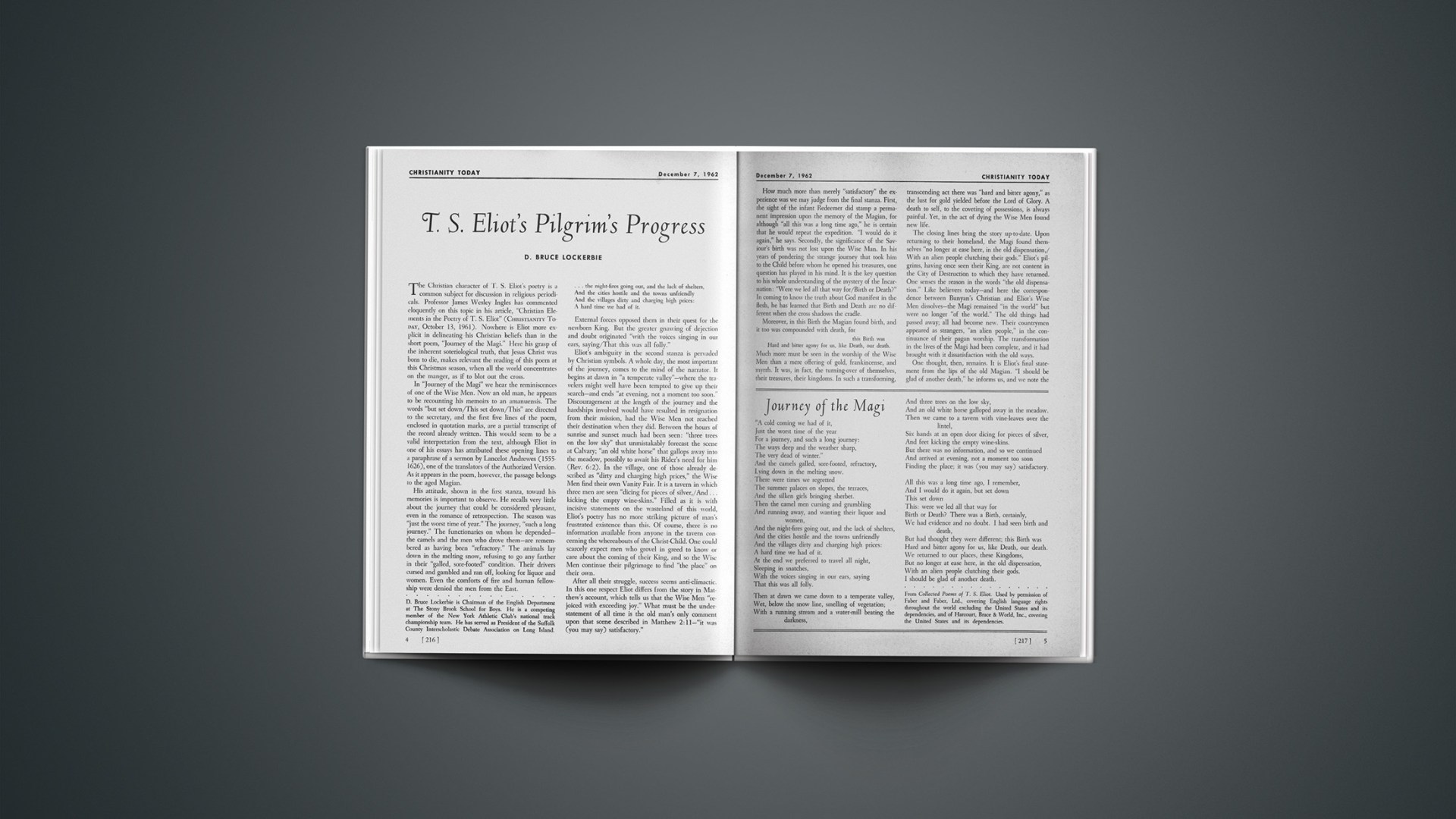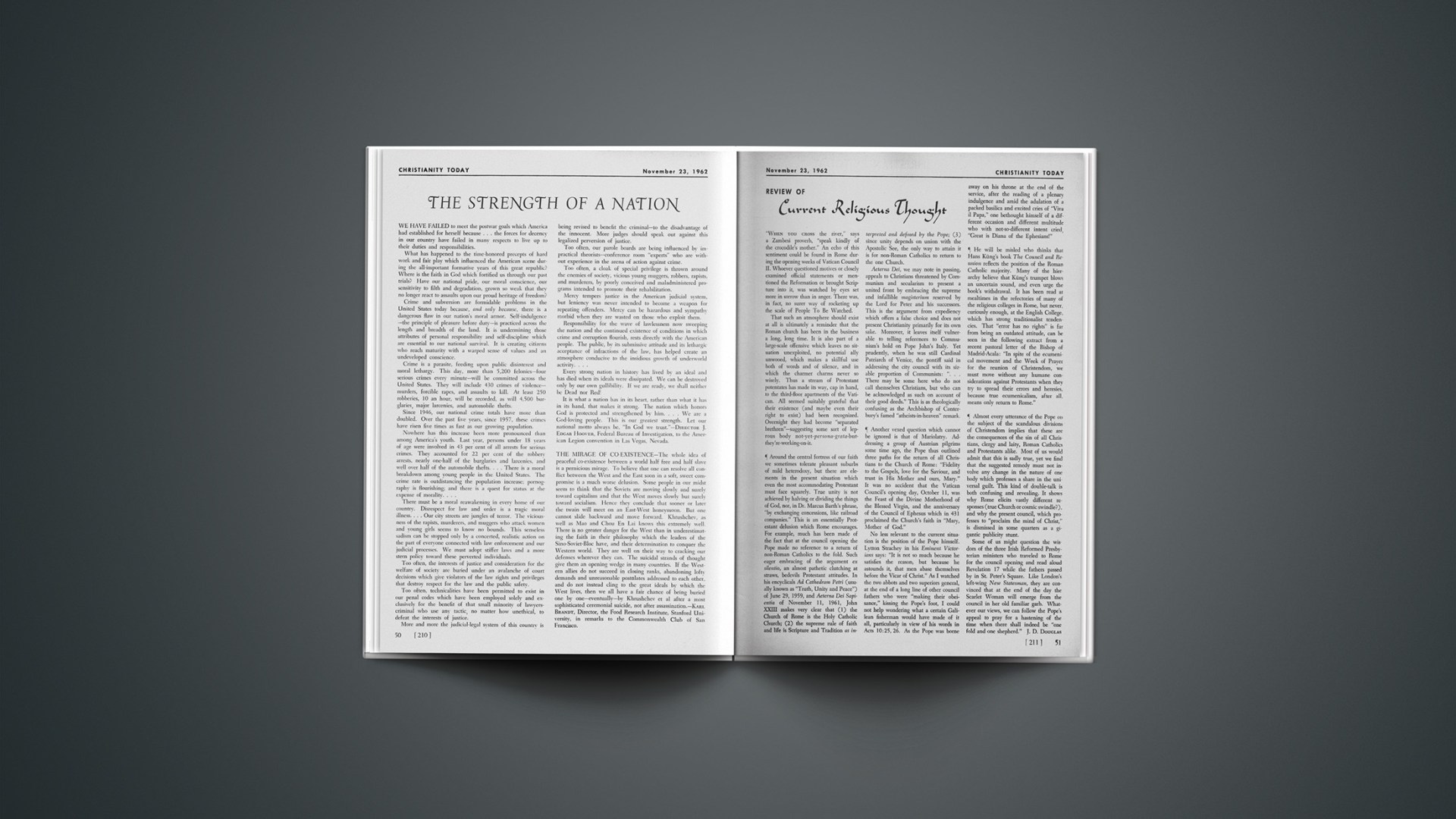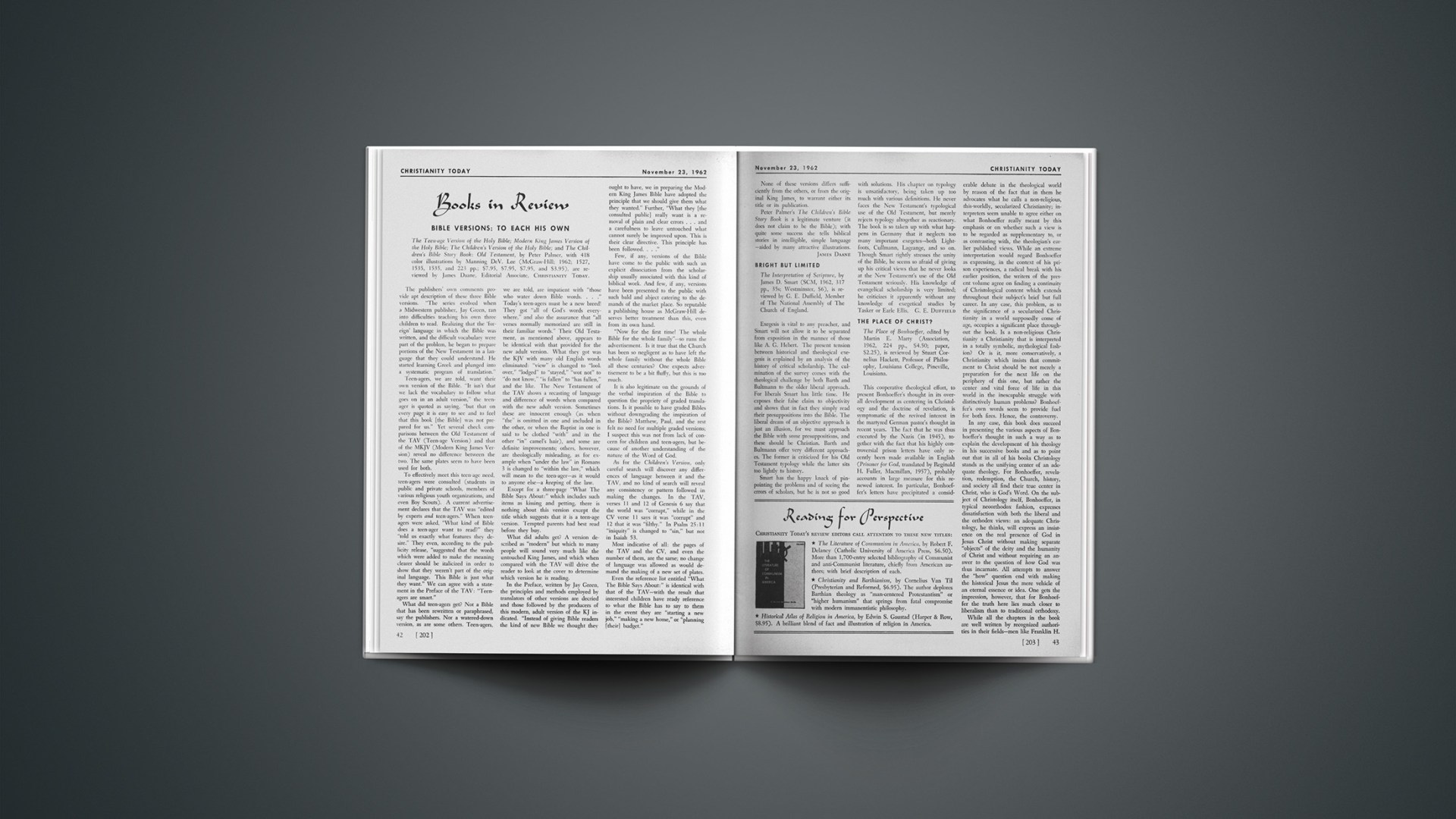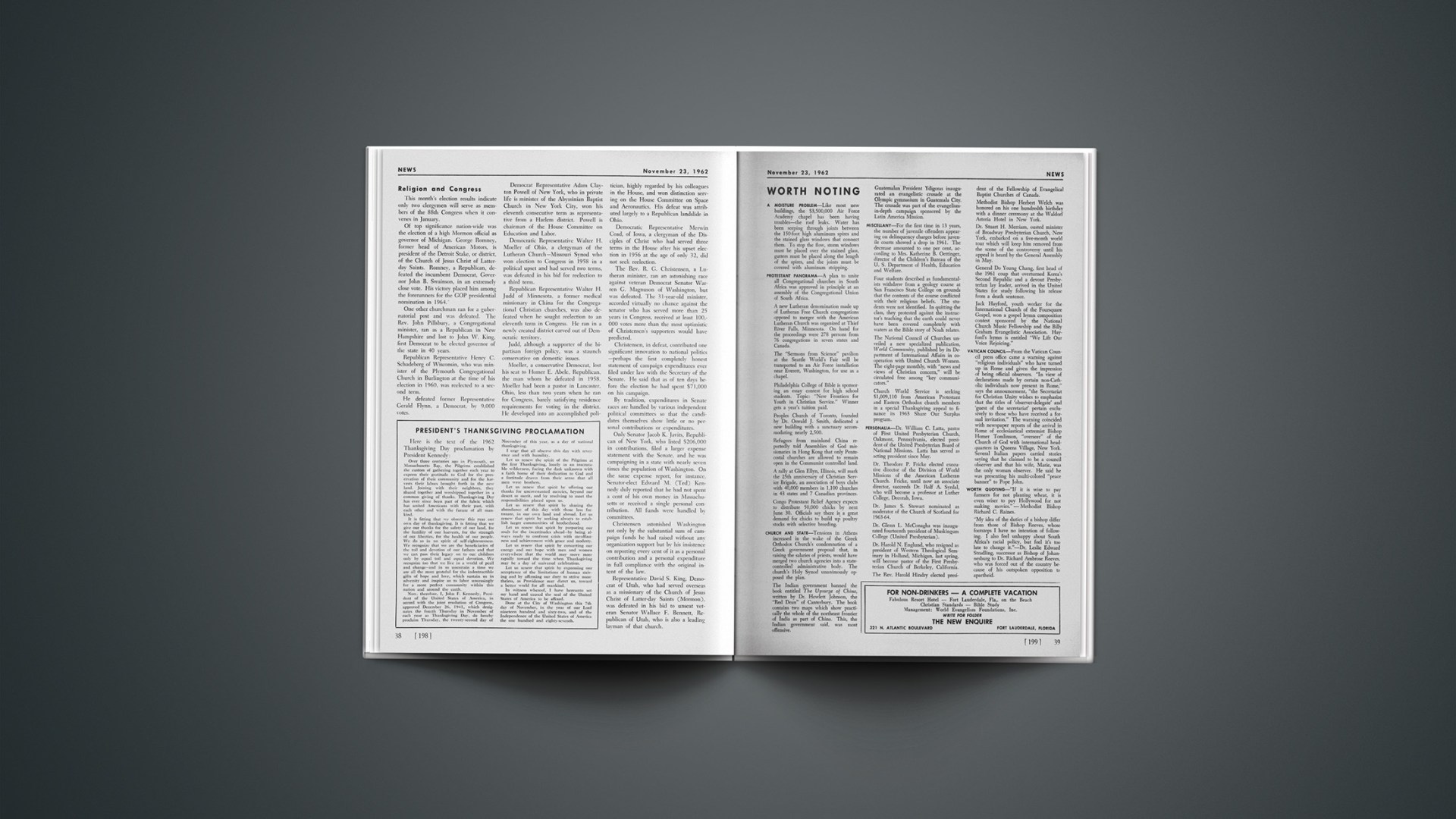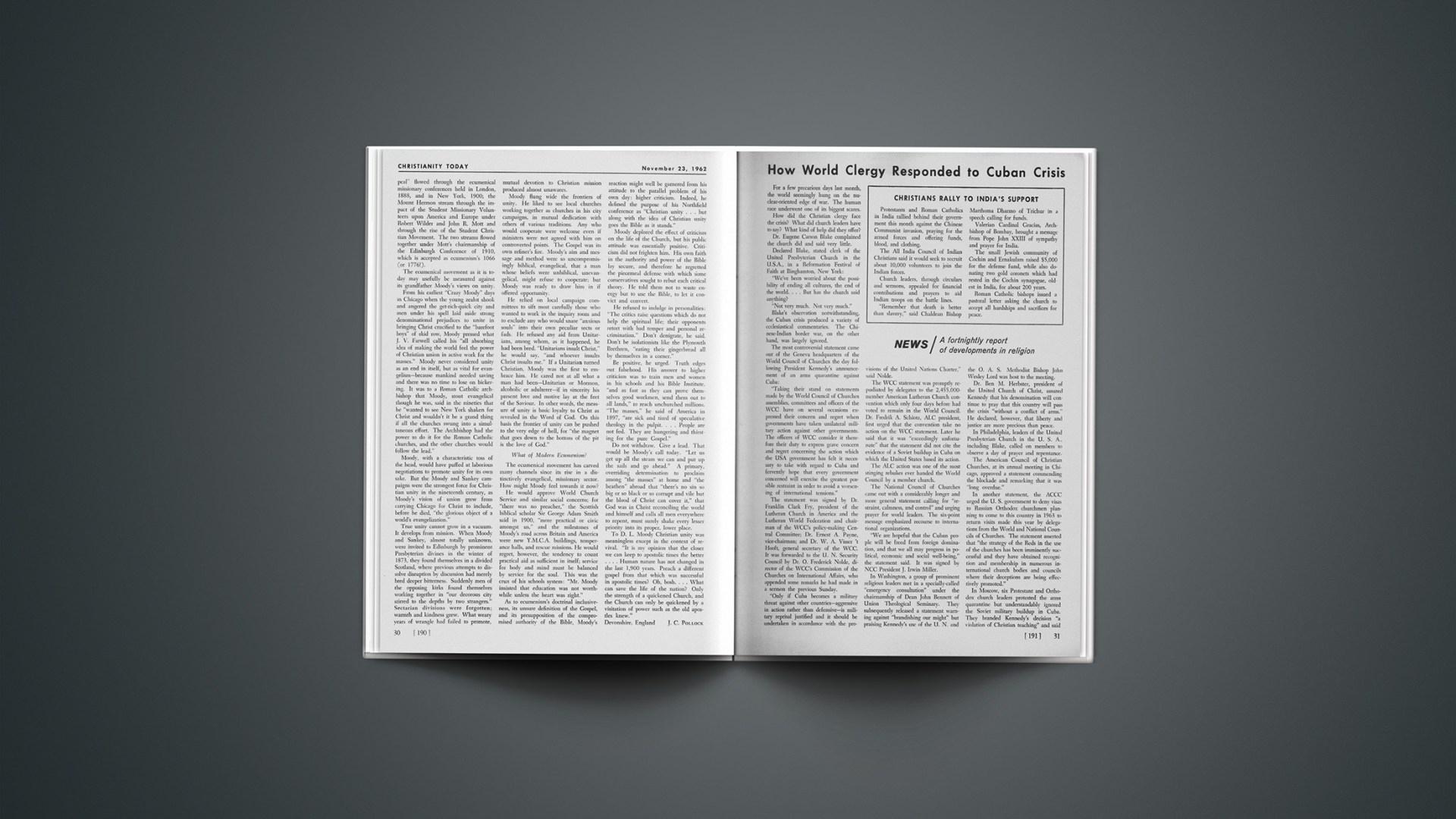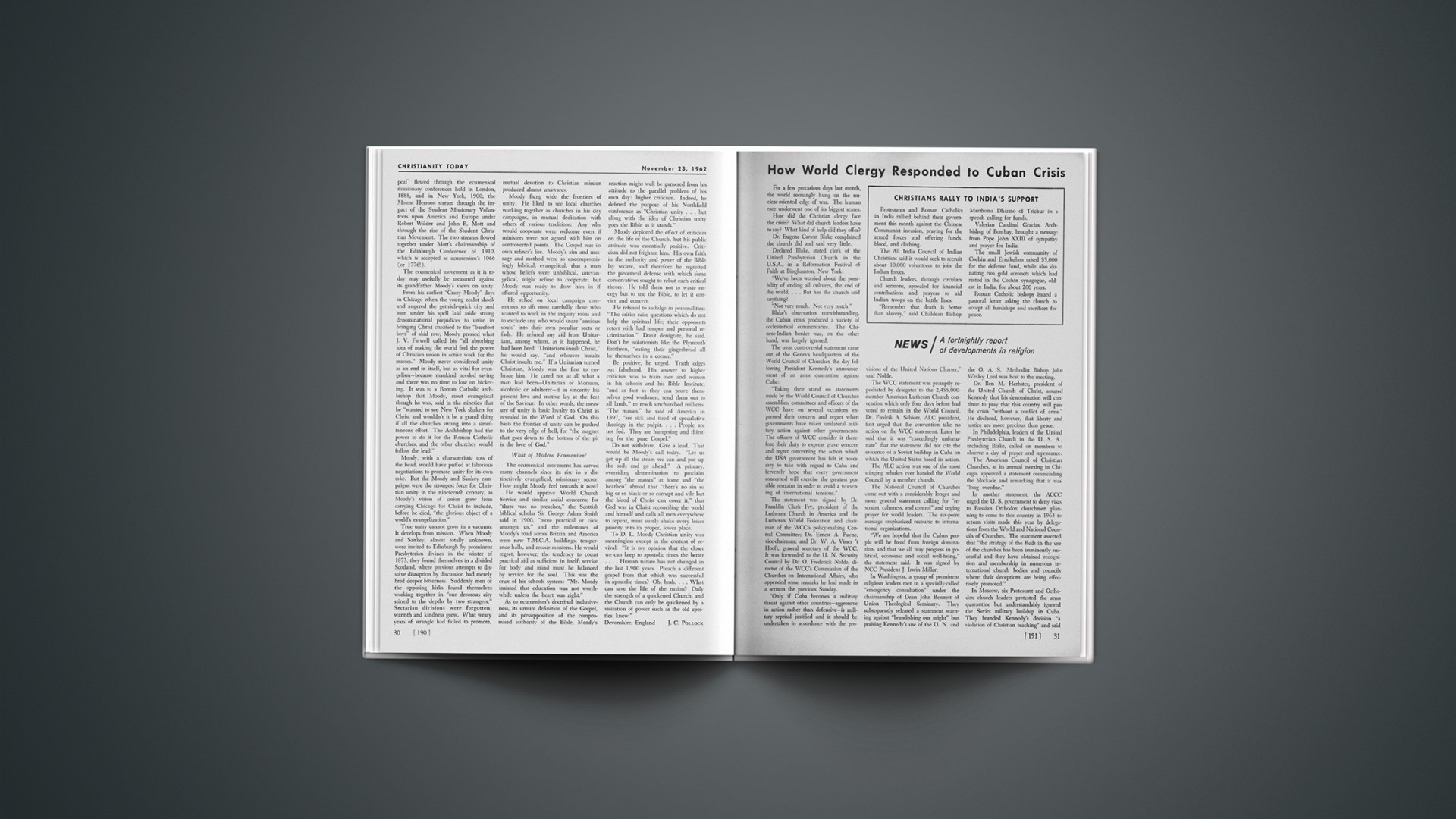And the Lord God said, Behold, the man is become as one of us, to know good and evil: and now, lest he put forth his hand, and take also of the tree of life, and eat, and live for ever:
Therefore the Lord God sent him forth from the garden of Eden, to till the ground from whence he was taken.
So he drove out the man; and he placed at the east of the garden of Eden Cherubims, and a flaming sword which turned every way, to keep the way of the tree of life.
(Genesis 3:22–24)
“Joy to the world” we sing, and Christmas preaching must be joyful. But the carol of Christmas is blown on a herald’s trumpet. It summons to decision: “Let every heart prepare him room!” Here is the deep seriousness of Christmas. How will you receive him? Christmas calls you to the decision of faith, the choice made once that decides eternity. Every Christmas cantata born of God’s Spirit calls to you, “Today, if you will hear his voice!”
Today! Christmas announces Jesus Christ, the mighty victor who has crushed Satan and opened again the way to the paradise of God. Christmas declares there is a way back to paradise, to eternal life. He is the Way, who was born in Bethlehem of the Virgin Mary. Refuse him, and there is no other way to the tree of life. Receive him today, and receive also the right to eat of that tree in the world of the consummation, where your choice is forever sealed.
The Christmas message says, “Come, let us adore him!” but it adds, “Today!” There is but once to choose!
In our text we see that God directs the way to paradise through Bethlehem and Calvary. We see the necessity of this way, the frightfulness of this way, and the grace of this way.
The Necessity Of This Way
Adam and Eve were driven from the garden under the judgment of God. Because they had eaten of the tree of the knowledge of good and evil they might not eat of the tree of life. Yes, there is judgment here; but to stop with judgment leaves our text unexplained. We find here, in the midst of judgment, a mighty deed of mercy. It is of grace that the Lord drives man from paradise at just this moment. We must set our text in the light of the Gospel. That Gospel of grace has just been revealed: “I will put enmity between thee and the woman, and between thy seed and her seed; it shall bruise thy head, and thou shalt bruise his heel” (v. 15). The Lord has promised Christ, who shall crush Satan and deliver men. Immediately after the Fall, the Gospel begins to lighten the world; its beams shine into the darkness from the words of our text, which follows so closely on the first promise.
To grasp verse 22 we must understand two things: first, the place of man in paradise; second, the place of the tree of life. When the Lord created man, man possessed a bestowed holiness through which he, as a son, loved his Father with a spontaneous, guileless love. But his love was like that of a child. Unaffected and sincere though it was, it was not yet the mature and deliberate love of his own conscious choice. In full freedom Adam had to choose for his Father and so pass from the love of a child to that of a beloved son. In order to bring Adam to this mature sonship, the Lord gave the tree of the knowledge of good and evil. Should Adam, in the moment of decision, make the good choice, he would stand before God as the son who had chosen in freedom for his Father, and for his Father’s service. And, once made, that choice would stand forever. God would fix it for eternity; it could never be altered. So choosing, man would choose his Father forever as his portion, his eternal Good. The commandment proves Adam in a moment of testing, but it decides for all eternity. Do you see the structure of the work of God? Man must make one choice, and this choice is decisive for eternity. The one choice is never made again. This is the ordinance of the Lord.
And now the significance of the tree of life, which is in the paradise of God. We read of that tree again in Revelation 2:7: “To him that overcometh will I give to eat of the tree of life, which is in the midst of the paradise of God.” This promise to the church of Ephesus stands in direct connection with the command: “Remember therefore from whence thou art fallen, and repent, and do the first works; or else I will come unto thee quickly, and will remove thy candlestick out of his place …” (v. 5). Do the first works. Live out a true faith, according to the law of God, to his glory. Show yourselves to be a church of the firstborn, who have the law written on the tables of their hearts. This is the life of the new choice, in which Satan is overcome and the power of death in the world is thrown back. To him who overcomes, who perseveres in his choice, “will I give to eat of the tree of life, which is in the midst of the paradise of God.” Into the paradise of God they come who have persevered in their choice, who have overcome Satan. They come now into paradise, that is, into the world of the fixed choice. They find now in paradise the tree of life, and they eat eternal life, so that they are forever fresh and green to do the will of their Father. The tree of life, then, belongs to the world of the fixed choice, to the world of the consummation, the paradise of God.
We find this same thought again in Revelation 22:14: “Blessed are they that do his commandments, that they may have right to the tree of life, and may enter in through the gates into the city.” Here again the tree of life stands in direct connection with the law as the rule of thankfulness, with the choice of the heart to serve God in obedience. They who here on earth, by Christ’s grace, abide by their choice and keep his commandments, these gain, in the world of the fixed choice, the freedom to eat of the tree of life. The tree of life blooms and spreads its splendid beauty and glory in the world of the consummation. They who enter paradise eat of it and serve the Father in eternal youth.
Adam did choose: not in obedience, but in disobedience. From the state of a guileless child he became a man who chose independently—but against the Lord, and in rebellion towards his Father. This is the working of the tree of the knowledge of good and evil. Adam did not only fall from holiness. He fell as a son, who in full freedom made a conscious choice. He became a disobedient son, with that poisonous choice in his heart. The Lord says of him: “Behold, the man is become as one of us, to know good and evil.”
No, that does not mean that man has now become like God. But he has become a man with an independent choice—and a man who will now lay hold upon the tree of life, but in apostasy, in disobedience to his God and Father. He will now stretch forth his hand to eat of that tree that stands in the world of the fixed choice. He will lay hold upon the world of the consummation.
Imagine that the man now eats of the tree of life, that now, in this moment, the world of the consummation comes and seals man’s state forever. Then he is for eternity a man who has chosen evil with an unalterable choice. The world of that fixed choice is hell, the world of everlasting horror. Then there is never again a way back. Then man can never return from the depths of misery into which he has plunged. Then there can never be Christmas in the world, there can never stand a crib in Bethlehem, and man shall never sing carols of salvation.
Do you see Satan, who in this moment almost has the whole world in his grasp for eternity? If he can now gain a little time—a few minutes—then man will eat of the tree of life and lay hold on the world of the fixed choice. Then it is finished. Bethlehem can never come, nor Calvary, nor Easter, nor the Ascension. There can never be a Church, a congregation of those born again of the Spirit, born again to a living hope through the resurrection of Jesus Christ.
Here is the bitter necessity of the way that leads out of the garden. Man must go out of paradise, away from the tree of life. The world of the consummation must not come now. Then we could never more emerge from the abyss of misery, and no dawn of salvation could ever break over the world.
Yes, God here saves man from the tree of life. He watches in this deadly hour. He watches over his own feast, the feast of his good pleasure to bring the world to its consummation in Christ. He watches here over the crib of Bethlehem, and the cross of Golgotha. He watches over the way of Jesus Christ who will come to fulfill all righteousness and to obtain the Spirit of adoption, the Spirit by whom the human heart is renewed in the power of the eternal covenant of grace. The Lord watches here over the great work that Christ shall perform, the work of the new birth of hearts—hearts with a new choice, a new will, moved of him to choose the Father as their portion, their eternal Good.
No, the world of the consummation must not come now, Adam’s choice must not be fixed for eternity, for in this world there must come the wonder of the new birth and of the church of the firstborn whose hearts are fixed to love God above all and to love their neighbors as themselves. And when the last reborn one is brought to God, see, then paradise can come, and the tree of life!
This is no tale out of the misty past, this is the history of redemption. The Lord in his hour saved us from the hands of Satan, out of the depth of hell, the abyss of eternal horror. He led us out of the world of the fixed choice that we in our misery should hear the Gospel of grace, that we should hear the holy secret of a God who freely justifies the sinner, that we yet once more should be put before the one choice: “Believe on the Lord Jesus Christ, and thou shalt be saved.”
For the way out of the garden leads back again, through Bethlehem and Calvary. There appears a way back to the Father, who is moved with compassion, a way back to the joy of the Lord. In this hour, Satan thought to carry off the world as his prize, and man as his slave forever, but he has lost the battle. The world of the consummation is postponed to the day of Jesus Christ. He now leads, through Bethlehem and Calvary, a multitude that no man can number, to enter God’s gates with praise, and his courts with singing. (The Dutch word for “court” [hof] also means “garden.”) Centuries must pass, but the hour shall surely come. The first way was shut that the second might be opened.
Brothers, the Christmas feast is ready (Ps. 149:5).
The Terror Of This Way
The road away from the garden was necessary. But what does it mean to walk that way, to enter a world without the tree of life? “Therefore the Lord God sent him forth from the garden of Eden, to till the ground from whence he was taken.” That means to enter a world where God breaks man’s powers, where disease shortens life, where tuberculosis lays waste and cancer destroys. A world where parents weep by the graves of their children, where the days of our years are threescore and ten, and their strength is labor and sorrow. A world of dead dust, and the dust of millions dead. The world of the Preacher of Ecclesiastes, filled with the tears of those who have no helper. A world of oppression through the cruelty of men, a world of blood and fire and smoke. A world where anguish mounts so high that if its days were not shortened no flesh could stand before God.
Who can know the sorrow, the woe which has mounted up to God from a heathen world since Adam left the garden? Who can number the tears, the streams of blood, the graves? The way of Bethlehem and Calvary is frightful to the flesh.
Yet even this frightfulness is better than a world without the grace of Jesus Christ, a world without Christmas, Calvary, and Easter. It is far better to bear this cross with the promise of the Gospel in this world than to know a world which can never be lifted from misery by God’s eternal compassion. For in this world with all its horror and oppression the Lord can now proclaim the Gospel. He can summon men to salvation in the Son of his love. He can write the beautiful words: “And God shall wipe away all tears from their eyes; and there shall be no more death, neither sorrow, nor crying, neither shall there be any more pain: for the former things are passed away.” In this world that one comfort in life and in death can now be heard: “Believe on the Lord Jesus Christ, and thou shalt be saved.”
In the agonies of our time, in war and disaster, men shake their fists at the Almighty. Men will not see their sin, and therefore they do not see the great mercy of God: he has sent men this way that there should be a way back, that the angels might sing, “Glory to God in the highest, and on earth peace, good will toward men.”
His grace sent man this way that one cross might stand in the world, the cross of the Lamb of God that taketh away the sin of the world; that Easter might come, with the jubilant cry, “Death is swallowed up in victory”; that the Ascension might come, with the promise that the consummation shall also come and paradise with the tree of life—for lo, He comes quickly!
Do not complain and murmur; bow your knees humbly before your Lord in the crib of Bethlehem and thank him that he has come this way. Let him dry your tears, who, as the Lion of Judah, has crushed Satan, opened paradise, and given you the right to eat of the tree of life.
Yes, we who are crucified, dead, and buried with Christ must through unspeakable strife enter into life. We are led in the way of suffering, and summoned to watch and fight and pray. Death enters our homes, and agony our hearts. But it is the only way to be saved, the only way to be drawn from the depths of misery by the arms of everlasting mercy. Thank God for the one way. Thank God for a world, full of horror though it be, where the choice is not fixed, where the hearts of sinners are renewed by the Holy Ghost. It is a world full of God’s wonders, full of anticipations of his advent: “See, I make all things new!”
We must again celebrate Christmas in a world of anxiety and oppression. In its misery we are tempted to hang our harps on the willows, and to refuse the carols of joy. How can we take up our cross with singing hearts?
But each day is now a day forward—out of misery, out of tears, out of grief. The way of God’s mercy is the way of salvation. He has raised up a star in Jacob; the Sun of Righteousness has appeared over the horizon. Let us confess that the ways of the Lord are right: right, though they go through the valley of the shadow of death; right, for they pass by way of Bethlehem and Calvary to the paradise of God and the tree of life.
Say not: “It is too hard; I cannot bear this way any longer.” Bear the trouble and sorrow for the sake of your brothers who must yet be born and reborn. Generations before you have borne the heat of the day and the cold of the night for your sake, and for His: that he should see his seed—he who for your sake become poor to open in this world a way to joy. Refuse him not your song, even though the cross cleaves your shoulder. He took the way before you, the only way. Of all sorrow he has borne the sorrow, and of all misery the misery, and see, he goes before you to the paradise of God and the tree of life.
The Grace Of This Way
“He placed at the east of the garden of Eden Cherubims.…” The garden had apparently but one entrance; perhaps it lay hidden as a valley in the midst of mountains. And now before that entrance the Lord sets up his throne. Where the cherubim are, there is the throne of God; they are the bearers of his glory. Paradise is God’s royal domain, where life blooms forever. Beside it there comes the flaming blade of a sword, perhaps like flashing lightning.
The Lord sets up these tokens of his presence in grace. By them he shows the first men that paradise remains, with the tree of life, but that the first way to the consummation is shut off. To pass that way is to meet the sword of God.
That sword teaches men to look for Christ, to pray the advent prayer: “Come, Lord, come quickly!” The consummation cannot come until Christ has come. What men cannot do, what is eternally impossible to them, He shall do. He shall fight the good fight and crush Satan. When he has fulfilled all, the sword will fall back and the throne of the Lord will be established on earth. Then God’s glory shall fill the world, the whole earth will be paradise, and every tree will be a tree of life.
This lesson of hope in Christ alone is taught to us in fullness at Bethlehem and Calvary. There is but one Mediator between God and men, the man Christ Jesus. He is the way, the truth, and the life. He has suffered the sword stroke of the holy righteousness of God, and in the strength of the eternal Spirit he has opened the gates of paradise, the world of eternal life.
And now the Gospel is preached: believe in Jesus Christ. Believe in the One whom God has sent. This is the earnestness of gospel preaching: there is but one way and one choice. Kiss the Son; lay hold on the Mediator. It is today that you must choose, as grace is proclaimed to you. He who refuses the Son, who will not come by way of Bethlehem and Calvary—he has no other choice forever. He finds no other way to paradise, but stands eternally in outer darkness, where there is weeping and gnashing of teeth.
But, oh, the depth of the riches of God’s grace! He who says, “Thou art my God, I will praise thee!”—his choice is now made fast for all eternity through the power that Christ has merited. He shall stretch forth his hand and take of the fruit of the tree of life and live forever.
Christmas is wonderful. But do you see where it leads? To the one choice, the choice that stands forever. This one choice is Jesus Christ. Bethlehem will not come again, nor will Calvary be repeated. Only He will come again, bringing the world of the consummation with him, when the last brother is reborn.
Have you made him your choice?
The King shall come when morning dawns,
And light triumphant breaks,
When beauty gilds the eastern hills,
And life to joy awakes.
Not as of old a little child
To bear, and fight, and die,
But crowned with glory like the sun
That lights the morning sky.
END

